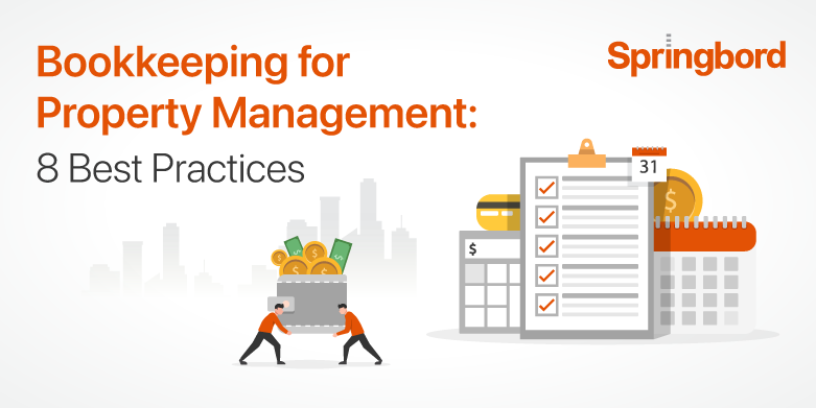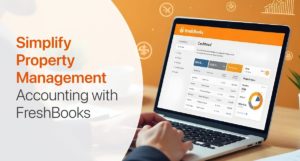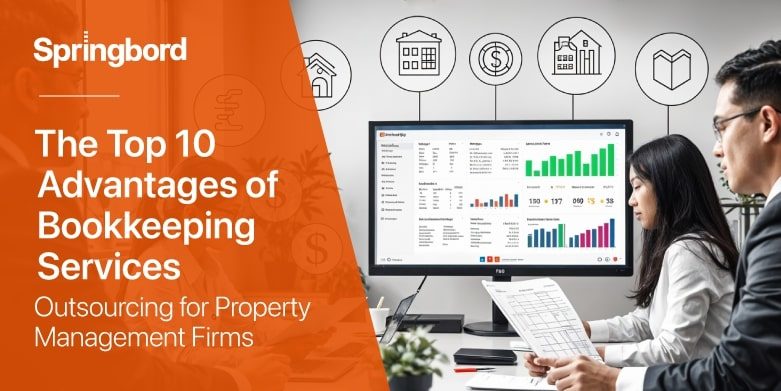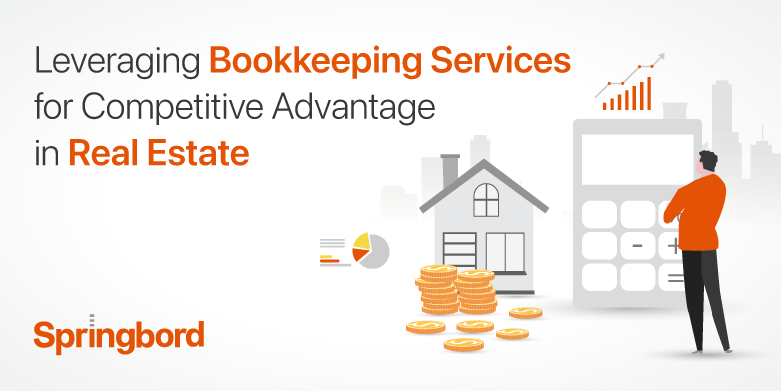 Read time 7 min
Read time 7 minProperty management accurately determines a property’s profitability is essential, whether it involves personal or rental properties. Effective financial management is not just about keeping the books; it directly contributes to tax savings, reduces operating expenses, and boosts rental income, thereby enhancing overall return on investment (ROI).
The sector’s substantial market size, reaching approximately $101.3 billion in 2021, highlights the necessity for precision in financial tracking and strategic planning. Recognising these challenges.
Establishing and maintaining robust accounting systems ensures that your property management business remains profitable and sustainable. This blog leads us to an exploration of optimal bookkeeping practices, aiming to enhance financial accuracy and efficiency in property management.
Separate Business and Personal Bank Accounts
When managing finances for a property management company, the separation of personal and business accounts is not just beneficial but essential for clarity and legal protection.

At first glance, personal and business bank accounts may seem similar—both can be checking or savings types and are used for managing money. However, the purposes behind each are distinctly different, and blending the two can lead to complications, especially as your business grows.
Key Differences and Benefits of Business Accounts:
- Legal and Financial Clarity: Separating your business and personal finances simplifies accounting and tax preparation, reducing the risk of errors and ensuring clear financial records.
- Enhanced Credibility and Professionalism: Using a business account lends credibility to your operations. It signals to clients, vendors, and financial institutions that your company is an established entity with serious business intentions .
- Risk Management: A business account helps protect personal assets from business liabilities. In case of financial disputes or business debts, having separate accounts can provide a crucial layer of financial protection .
- Banking Requirements and Features: Business accounts often come with features tailored to the needs of companies, such as the ability to manage multiple signatories, higher transaction limits, and merchant services.
Springbord services are designed to not only help in setting up and managing these separate accounts but also in leveraging them to gain better financial insights and operational efficiencies.
Accounting Methods
In property management, financial transactions can be tracked using two primary methods: cash basis and accrual accounting. Each has distinct features suitable for different management styles.
Accrual Accounting
This method records earnings and expenses as they occur, regardless of actual cash flow. It can be complex and may occasionally present misleading profitability if not managed carefully.
Firms utilising accrual accounting typically need to submit detailed financial statements to regulatory bodies, ensuring compliance and transparency.
Cash Basis Accounting
Cash-based accounting is straightforward and records transactions only when cash is exchanged in hands. It’s preferred by many small businesses for its simplicity and clear snapshot of available cash. This method is particularly effective for immediate financial assessment but might overlook upcoming liabilities, potentially leading to misjudged financial decisions.
Springboard specialises in adapting accounting systems to the specific needs of property managers, ensuring both simplicity in daily financial management and compliance with accounting standards.
Whether you prefer the detailed financial insight of accrual accounting or the simplicity of cash-based accounting, Springbord can help streamline your financial operations.
Chart of Accounts
If you need more time with property management accounting, a well-structured chart of accounts might just be your tool. Think of it as a comprehensive cheat sheet, simplifying your financial tracking and reporting.
A chart of accounts organizes all financial transactions into a systematic framework, making it easier to record and track every rent payment, invoice, or annual bill.
This systematic categorization acts as a roadmap to your business’s financial health, akin to a tax deductions guide for property management.
Components of a Chart of Accounts
- Balance Sheet Accounts: These include all the accounts needed to compile a complete balance sheet. You’ll find categories for assets, liabilities, and equity, which provide a snapshot of your business’s financial standing at any given time.
- Income Statement Accounts: This section covers all revenue and expense accounts, crucial for preparing detailed profit and loss statements and understanding cash flow.
At Springbord, we help integrate a customised chart of accounts tailored specifically to your property management needs, ensuring every transaction is accurately categorised and easily accessible.
Bookkeeping Methods
Understanding the difference between bookkeeping and accounting is crucial in property management. Bookkeeping involves recording transactions while accounting also includes analyzing these records.
Single-Entry Bookkeeping
This method records transactions as single entries and is suitable for small, uncomplicated businesses. It’s akin to a personal chequebook but provides limited financial insights, making it less ideal for detailed financial analysis.
Double-Entry Bookkeeping
Double-entry bookkeeping records each transaction twice (as debits and credits) and is crucial for larger businesses.
It ensures accuracy and balance in financial reports, supporting the creation of comprehensive financial statements like balance sheets and profit/loss statements.
Springbord helps property management companies with expert guidance to ensure your financial operations are streamlined and prepared for growth.
For those seeking precision and expertise, our professional bookkeeping services are designed to enhance your financial management and drive success.
Streamlining Property Management Accounting with FreshBooks
For property management businesses that require a powerful and efficient accounting system, FreshBooks stands out as an optimal solution.

This software is specifically designed for the property management sector, streamlining tasks like rent collection, property management, and bank reconciliations.
FreshBooks offers an easy-to-use interface that automates the generation of detailed reports and ensures accurate financial tracking, even for users without extensive accounting knowledge.
Benefits of Using FreshBooks for Property Management
- Automation: FreshBooks automates routine accounting tasks, reducing the time and effort required to manage financial records.
- Cost Savings: By using FreshBooks, you can potentially save on the costs associated with hiring an in-house accountant.
- Ease of Use: The software is user-friendly, making it accessible for all employees, which diminishes the need for extensive bookkeeping training.
- Trial and Learning Resources: FreshBooks offers a free trial along with numerous educational resources to help users understand bookkeeping for property management comprehensively.
Springbord assists property management companies in setting up and maximising FreshBooks to its full potential, ensuring the software aligns perfectly with business processes and accounting requirements.
Invoices and Receipts
Effectively handling invoices and receipts is crucial for maintaining positive cash flow and ensuring financial accuracy.
An invoice is essentially a bill: it outlines what a tenant owes for rent or services provided by the property management. It’s a formal payment request and details the amount due.
In contrast, a receipt is proof of payment, given to the tenant once the invoice is settled. It confirms that the transaction has occurred, which is vital for both parties’ records.
Proper management of invoices and receipts is fundamental in preventing payment delays and reducing human errors in bookkeeping. Well-organized records of invoices and receipts are invaluable for tax purposes. They ensure that all financial transactions are documented, making it easier to claim expenses and manage tax obligations.
At Springbord, we recommend leveraging top-quality property management software to automate and streamline the handling of invoices and receipts.
Unexpected Expenses
Managing a rental property involves preparing for unexpected expenses, from appliance replacements and maintenance to potential vacancies and fluctuating costs like taxes or insurance.
Experienced property managers know the importance of budgeting for unforeseen costs. Utilizing advanced rental property accounting software is essential, as it aids in effectively forecasting and reserving funds for such events.
Springbord offers tailored solutions that incorporate cutting-edge property management software, helping managers allocate and manage budgets efficiently.
Our services ensure preparedness and financial stability, enabling managers to address unexpected expenses without compromising their operations. Ready to enhance your property management strategy? Contact Springbord today to discuss how our services can support your needs.
Bank Reconciliation
Monthly bank reconciliation is vital for maintaining an accurate rental property accounting system. Though it may be time-consuming, this practice is essential for preventing and identifying financial discrepancies.
Benefits of Bank Reconciliation
- Error Detection: Regular reconciliation helps spot errors, typos, and missing entries that might otherwise go unnoticed.
- Financial Accuracy: It ensures all transactions are accurately recorded, providing a clear financial picture.
- Fraud Prevention: Regular checks can help detect unauthorized transactions early.
Modern bookkeeping apps streamline the reconciliation process, allowing you to start promptly and track every change efficiently. These tools automate much of the work, making it easier to maintain accuracy and stay on top of your finances.
Springbord solutions integrate advanced software tools that simplify this process, ensuring your financial records are always accurate and up-to-date.
Tax Deductions
Efficient bookkeeping not only keeps your finances in order but also helps identify valuable tax deductions.
While it won’t eliminate your tax obligations, understanding and tracking these deductions can significantly reduce your taxable income.
Key Tax Deductions for Property Management Firms
- Training and Education
- Business Vehicle Mileage
- Bookkeeping Services
- Repairs and Maintenance
- Legal Fees
- Real Estate Taxes and Mortgage Interest
- Advertising
- Insurance
- Lease Cancellation Costs
- Employee Wage
- Contractor Payments
At Springbord, we help property management companies maximize their tax deductions by ensuring all eligible expenses are accurately tracked and recorded.
Our advanced bookkeeping solutions provide detailed financial records, making it easier to identify deductible expenses and comply with tax regulations.
Conclusion
Mastering bookkeeping is your secret weapon for success. By separating business and personal accounts, choosing the right accounting methods, and leveraging tools like FreshBooks, you lay the groundwork for financial clarity and efficiency.
To truly optimize your financial operations, consider outsourcing bookkeeping services to a dedicated partner like Springbord. Our expert team specializes in providing tailored bookkeeping solutions that streamline your processes and enhance accuracy. By outsourcing, you can focus on what you do best—growing your property management business—while we handle the numbers.
Let us turn these best practices into your everyday reality, ensuring your property management business not only survives but thrives. Dive into a future of streamlined operations and financial stability with our comprehensive bookkeeping services.
Dive into a future of streamlined operations and financial stability with our tailored solutions.
FAQ
Why should I keep business and personal bank accounts separate?
It makes accounting easier, protects your assets, and ensures clear financial records.
What is the difference between cash and accrual accounting?
Cash accounting records money when received or spent, while accrual records transactions when they happen.
Why is bank reconciliation important in property management?
It helps find errors, prevents fraud, and keeps your financial records accurate.
What bookkeeping software is best for property management?
FreshBooks is a great choice as it automates invoices, tracking, and reporting.
How can bookkeeping help reduce taxes for property managers?
Tracking expenses like repairs, insurance, and wages helps lower taxable income.
What does a chart of accounts do in property management?
It organizes income, expenses, and assets to track financial health easily.
Should property managers outsource bookkeeping?
Yes, it saves time, reduces errors, and ensures accurate financial management.







